|
|
SpeakBeak Services
Infants and toddlers are never too young for a speech pathology assessment. This could be for evaluation of play skills, pre-language skills, communication skills or a feeding assessment. We assess and manage children from infancy, to ensure developmental milestones are obtained, and that a child is achieving their potential.
Ultimately, the right time to seek advice and help is when you, as a parent, are concerned.
Below are some of the areas that we can offer assessment and therapy for:
Pre-Language and Play Skills
 |
Even before an infant can talk they can communicate and interact with you! To begin with a baby relies on their parents or carers to interpret their cries and sounds with meaning (e.g. hunger, tiredness, need for a nappy change!). Soon the newborn begins to use different sounds to indicate different needs. Without words, the infant uses other ways to tell you how they are feeling. For example, they may turn their head from the spoon to say “no more!”, or they may gaze into your eyes and laugh to let you know they are enjoying your company.
|
Sometimes these infant ‘cues’ are very subtle and parents can benefit from some assistance in interpreting what their baby is trying to ‘say’. SpeakBeak Victoria can provide training to enhance a parent’s ability to read and interpret their baby’s messages.
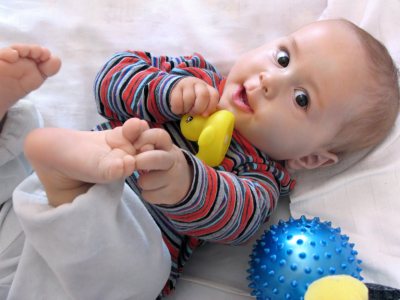 |
Play and social interaction in the first 12 months of life are considered the precursors to language development. Infants and young children learn many of the ‘rules’ of communication through play activities. This ranges from basic turn taking skills (e.g. rolling a ball back and forth, playing ‘peek-a-boo’) to looking at or showing you interesting toys or objects.
|
Initially your baby may interact with objects by putting them in their mouth to explore. An infant’s mouth is very sensitive and lets them learn much about the world around them. As they grow older, they may enjoy shaking and banging objects. Eventually your infant will begin to imitate you in games, enjoy familiar songs and routines (e.g. “twinkle twinkle”, “patty cake”), and then begin to demonstrate some ‘pretend’ play (e.g. feeding their teddy with a spoon).
SpeakBeak Victoria can provide you with useful playtime strategies to enhance the interaction between you and your baby / toddler, to facilitate language and social development.
Language
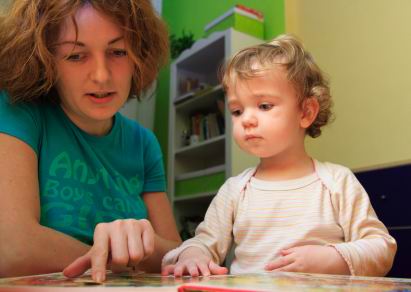 |
Language skills can be broken up into use (expressive language), and understanding (receptive language). Children will understand words and concepts before they begin to use them in their own speech. As your child gets older, they will use words in many different ways (for example: requesting objects / toys, commenting / naming objects and people… and for refusing!). A typically developing child will also be able to understand longer instructions as they get older (e.g. “brush your teeth and go get your shoes”).
|
We will soon be uploading a fact sheet regarding the milestones for language development over the first few years of life.
SpeakBeak Victoria can assess your child and provide you as a parent with some useful strategies to provide a language-rich learning environment. Therapy sessions may also be recommended to encourage language development, and ensure your child reaches their developmental potential. A hearing assessment by an audiologist is also often suggested as hearing or recurrent ear infections can impact on a child’s language development.
We may also assess how your child uses language to interact with others (pragmatics). Pragmatics refers to the ‘unspoken’ rules of social interaction and conversation, something that most children will learn through watching their parents and other children. It includes things like understanding how to take turns in a conversation, staying ‘on topic’, as well as body language and eye contact.
Speech
 |
Speech, or ‘articulation’ refers to the sounds that we use in talking, and how we put these sounds together to make words. Children go through stages of acquiring the sounds of speech just as they go through stages in acquiring words or language. It is quite normal for children to be unable to say particular sounds at particular ages; some speech sounds require quite tricky tongue acrobatics!!
We will soon be uploading some general guidelines about the speech sounds a child should begin to say by various ages.
|
Remember, if you are concerned about your child’s speech it is recommended that you have a speech pathology assessment to ensure your child is progressing along in keeping with their age and overall development. SpeakBeak Victoria can design individually tailored therapy programs to target speech sound errors, and train parents to provide therapy at home.
Feeding
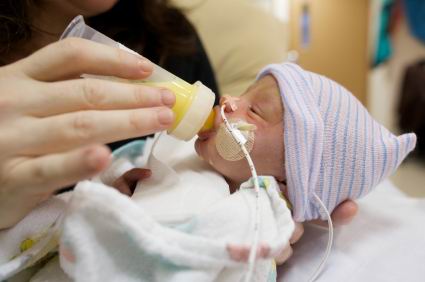 |
Infant and toddler feeding assessment and management is an area of specialty at SpeakBeak Victoria.
We see children from birth in regards to their ‘oral motor’ skills. This means, for example, their ability to attach to a bottle teat or breast; how their tongue, lips and jaw work to suck fluid efficiently; and how they coordinate the ‘suck-swallow-breathe’ cycle.
|
In these infants, signs that might indicate the need for a speech pathology assessment include: spillage of fluid out of the mouth, difficulty attaching to the teat / nipple, breathlessness during or after a feed, tiredness or sleepiness during a feed, or coughing and gagging with feeds.
It is important that you discuss any of these signs with your GP or paediatrician as they may indicate an underlying medical condition.
We are also specialised in weaning infants and children from tube to oral feeding, and can provide an individualised therapy plan to assist with this transition.
 |
The introduction of solid foods, and the transition to cup drinking can also be a time of uncertainty for parents. SpeakBeak Victoria can assess your infant for their developmental readiness to commence puree solids, or to assist in progression through to lumpy textured foods, hard finger foods and beyond.
|
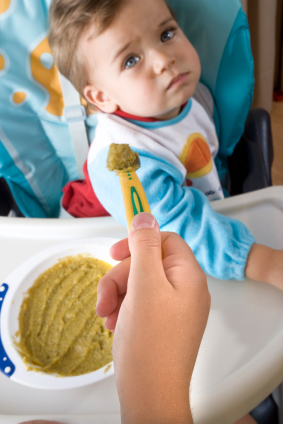 |
Some children can be particularly ‘fussy’ eaters. Fussiness is part of normal development, and a child’s desire to assert their independence. However, some children are so fussy that they refuse many types of food.
A child may become so aversive to foods that they may gag or vomit upon seeing or touching some foods. Such reactions may be caused by sensory difficulties (e.g. in Autism Spectrum Disorders), oral motor difficulties (e.g. they child may not be ready for a particular texture) or other behavioural factors.
|
Ultimately, this causes much anxiety to the parent and the child, and makes mealtimes difficult and stressful. SpeakBeak Victoria can provide comprehensive assessment and a structured mealtime plan to assist parents to manage their child’s eating difficulties.
Autism Spectrum Disorders
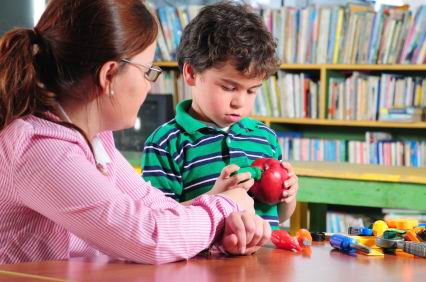 |
Assessment and therapy for Autism Spectrum Disorders is another area of specialty at SpeakBeak Victoria.
Speech Pathologists are important in the multidisciplinary assessment of Autism, providing comprehensive evaluation of a child’s communication profile (including language skills, pragmatic skills, and play / behaviour) which may assist your paediatrician / GP in reaching a diagnosis.
|
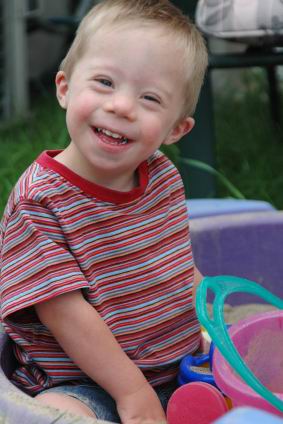 |
Early Intervention from a speech pathologist is part of the ‘gold standard’ for the management of Autism Spectrum Disorders. SpeakBeak Victoria can tailor make therapy programs to suit a child’s individual strengths, interests and difficulties, including:
- Communicative intent with pre-verbal children
- Development of language skills
- Pragmatic skills, including social interaction (eye contact, turn taking)
- Provision of non-verbal communication strategies (e.g. PECS)
- Higher level language in older children (the understanding of jokes, non-literal interpretation, ‘double meanings’ etc).
|
|








